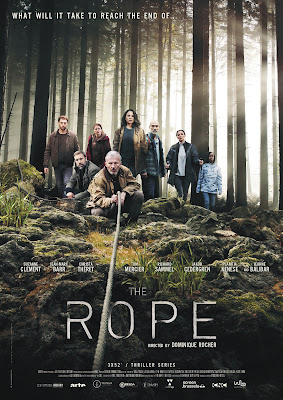Marie-Antoine Careme is considered the first celebrity chef, who greatly shaped French cuisine as we still know it with his recipes for the so-called “mother sauces.” During the aftermath of the French Revolution, Careme was also one of the first chefs who had to worry about getting “chopped.” Whether he likes it or not, the culinary prodigy caters to some of France’s most powerful leaders, even including Emperor Shorty, in co-creators Ian Kelly & Davide Serino’s eight-episode Carême, which premieres today on Apple TV+.
Careme was never particularly political, but his mentor and adopted father Sylvain Bailly was a little too free with his ant-Bonaparte sentiments. As the cops drag Bailly off, he urges Careme to seek out Prince Talleyrand, the Machiavellian foreign minister and sleazy Clark Clifford-like behind-the-scenes power broker.
Unfortunately, seeking Talleyrand’s help is like jumping out of the frying pan into the fire. Reluctantly agreeing to be Talleyrand’s spy in the Tuilieries, Careme steals Napoleon’s itinerary, which the old schemer uses the stage a false flag assassination attempt that he conveniently foils. Consequently, the deeply compromised Careme finds himself at Talleyrand’s mercy, especially with Minister of Police Joseph Fouche connecting the dots.
Fouche represents a dangerous choice of enemies. He is an unrepentant Jacobin, who literally sent thousands of his countrymen to their death. Fouche’s political allegiance might have switched to Napoleon (ostensibly, much like Talleyrand in that respect), but his true loyalty is to the guillotine. Indeed, it is important to remember the Jacobin’s blood-thirsty authoritarianism laid the foundation on which modern socialism was built.
Careme would rather just cook, but he must navigate Talleyrand’s feud with Fouche. Of course, he cannot trust either, as he quickly figures out. At least Henrietta, the maid serving Talleyrand’s consort, Catherine Grand. has her charms. Agathe, Careme’s chief deputy in the kitchen, also finds him quite interesting too, but it is not clear whether the brilliant but distracted chef notices.
Although based on Kelly’s nonfiction book, the series appears to use a healthy amount of artistic license. Fortunately, it results in some intriguing drama. The bounteous secret alliances and double-crosses are all quite entertaining. Indeed, it is all quite French—as in the France of boudoirs, but not excessively so. In terms of explicitness, Careme probably lands somewhere between NY Blue and vintage HBO.
Maybe Careme’s food really was delicious, but we’re all beater off eating in an era when chefs never double-dip their tasting spoons. Regardless, Benjamin Voisin’s Careme really isn’t the star, even though he is the title character and has the most screentime. Instead, Jeremie Renier takes complete ownership of the series with his wonderfully sly and devilishly charismatic performance as slippery old Talleyrand.




























